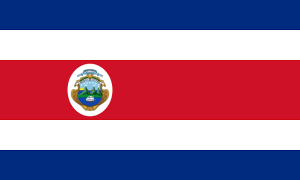Language/Spanish/Vocabulary/Costarican-Slang
Every country has his own colloquial vocabulary and Costa Rica isn't the exception. This country is recognized worldwide as one of the most beautiful countries to spend the vacations. Holder of an exuberant natural wealth, beautiful beaches, volcanoes, mountains, natural species and nice people.
But, to understand the dialect of the persons of this country is a task extremely complicated for a foreigner, though it has knowledge of Spanish language, due to his slangs.
So, then I will explain some words or phrases that can help you to understand his culture.
Costarican Slang[edit | edit source]
- Aguja: Barrier for cars (For example, a parking).
- Alistarse: To be prepared.
- Arremedar: To imitate.
- Bajoneado: Sad.
- Bomba: Gas station.
- Bombeta: Someone who is in the middle of everything.
- Brete: Job.
- Adulador: Flatterer.
- Cabanga: Homesick.
- Coger: Having sex.
- Carga: Someone who does admirable things.
- Carreta: Slow.
- Cartucho: Inhabitant of a province called Cartago.
- Cachos: Horns.
- Chanchos: Ass.
- Chancletudo: Contemptuous form to name persons with careless aspect.
- Chinear: To spoil.
- Chiva: Good, Very good.
- Chueco. Twisted.
- Chuzo: Good sort.
- Condominio: Suburbs
- Buena cuchara: Good cook.
- Cuero (a): Ugly person.
- Cuerero (a): Person who inspires love in ugly persons.
- Dar por la nuca: Too expensive.
- Dar un yeyo: To have a fall.
- Despapayar: To break.
- Devolver los peluches: This expression is in use when a pair fights or separates.
- Diay: It can mean: What, What happened, Now what. They are in the habit of using it for everything.
- Dicha: Luck.
- El burro hablando de orejas: Equivalent expression "The pot calling the kettle black".
- Embarrialado: With a lot of mud.
- Ese mae se coge lo que se mueva: That boy goes to bed with anyone.
- Gringo: "Informal" way to calling the people of English speech.
- Está caliente: Be hot.
- Reventado: Good looking, Handsome.
- Arratonado: To have muscular pains.
- Fachudo: Ugly.
- Gorditos: Little fats.
- Guachiman: Person who "helps you" to find parking and receives from you " the tip " for it.
- Güila: Kid, Boy.
- Labia: To have the gift of the gab
- Ir encarrerado: To have hurry.
- Jalarse una torta: To get into problems or To have a not looked son.
- Jalea: Jam
- Juega de vivo (a): Stuck up, Vain.
- La cereza en el pastel: The better part.
- La última chupada del mango: Person who believes herself better than the others.
- ¿Le faltó noche o le sobró amor?: Colloquial expression to use with someone who is or seems to be tired.
- Llevarse entre las patas: To pick up.
- Mae: It would be the equivalent to "Dude". In other words, a colloquial word to speak about someone.
- Majar: To tread.
- Mandado: To take message.
- Manudo: Fans of a soccer club called Liga Deportiva Alajuelense.
- Morado. Fans of a soccer club called Saprissa.
- María: Taximeter.
- Me regala: Sell me.
- Mejenga: Soccer match among friends.
- Pura Vida: Expression of very habitual use in Costa Rica that serves to say "Hello", "Good-bye", " How are you " … or even an adjective to define a person. Someone can be a Pura Vida if he or she is good with someone else.
About the Costarican.[edit | edit source]
The words here exposed are sure only the smallest part of the Costa Rican dictionary. Nevertheless, in the next days I will be adding more words of this curious dialect.
Before ending, also I would like to notice that in this country habitually they will treat you as "usted" (or "vos" in some regions), independently of your age, sex or social class. So I encourage you to that as far as possible you are with them so respectfully as they it are going to be with you.
Other Lessons[edit | edit source]
- How to Say Good Bye
- Razones para Visitar Cali Colombia
- Spring
- Feelings and Emotions
- longest word
- Cycling
- Useful Sentenses
- Animal
- English Spanish False Cognates
- How to sound more natural

